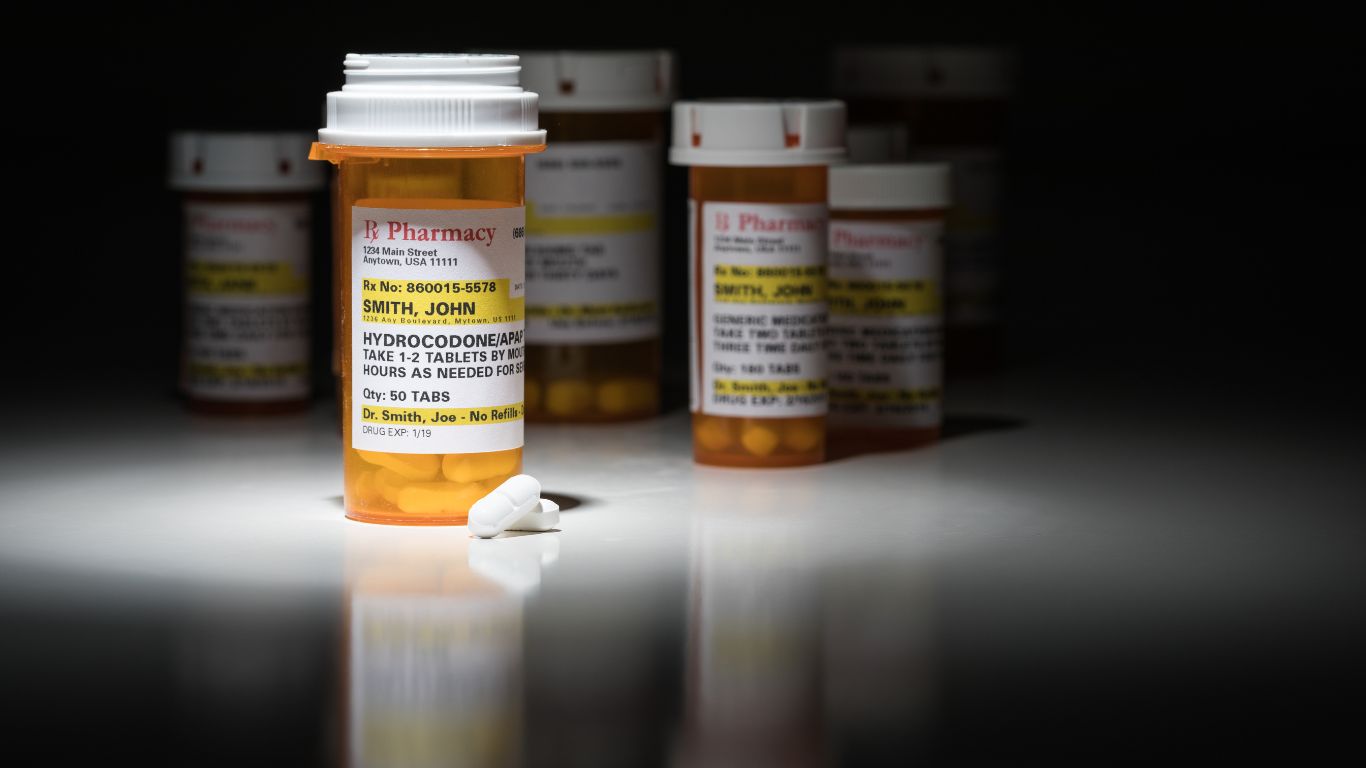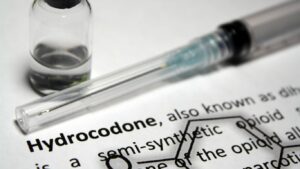What Makes Hydrocodone Addictive?
Hydrocodone is a Schedule II semi-synthetic narcotic drug similar to Oxycodone that is prescribed to people for severe pain, usually after a surgery or injury, or for certain serious health conditions. It is an opioid drug that acts on the central nervous system (CNS) to stop pain messages from getting through by binding to opioid receptors. Because it affects the CNS, it also has the effect of slowing breathing, slowing heart rate, affecting mental functions, producing feelings of relaxation and euphoria.
Acetaminophen is often added to hydrocodone, under the brand names:
- Lortab – pink tablets or white with pink, green, or blue specks that say UCB on the side and a number on the other
- Norco – white tablets with orange specks that say WATSON on one side and 913 on the other, light orange tablets that say NORCO 729 on one side, or yellow tablets with NORCO 539 on one side)
- Vicodin – white tablets with VICODIN debossed on one side and the dosage amount on the other
Abusing these drugs can lead to a serious risk of liver damage and overdose, especially if extended-release pills are crushed and snorted.
Zohydro is a type of Hydrocodone without acetaminophen added. It is found in white, dark blue, light green, or brown capsules that say Z3(dosage amount) mg in black ink on the side, and is rarely prescribed, except for extreme cases of severe pain in those who are opioid tolerant.
These powerful drugs are all extremely addictive because the body forms a dependence on having these drugs in your system, altering brain chemistry so you need to continue taking the drugs just to feel normal and get through the day. Over time, as you develop a tolerance for opioids, it takes more of the drug in the system so you can feel normal, without experiencing withdrawal symptoms. This dependence creates behavioral changes and compulsions, causing you to also develop a psychological dependence, so you begin to feel like you need the drug even if you don’t want to use it anymore. It becomes central to your existence, and slowly addiction takes over your life.
If you or a loved one are prescribed opioid medications, it is important to always use them as prescribed and speak with your doctor if you feel they are no longer working as they once did. This could be a sign that your body has developed a tolerance. Never increase your own dosage or take opioid drugs when you do not need them.
Signs of Hydrocodone Abuse
Using Hydrocodone, even as directed by a doctor, can have detrimental effects on the body like constipation, dry mouth, nausea, irregular heartbeat, mental confusion and disorientation. When a person is abusing Hydrocodone, they may:
- Take the pills more often than they were prescribed
- Crush and snort the pills for a faster high
- Continuing to take the drugs even though they are no longer needed
Signs of Hydrocodone Abuse include:
- Blurred vision
- Confusion
- Stomach problems like diarrhea, constipation, or vomiting
- Euphoria
- Itchy skin
- Lightheadedness
- Slurred speech
- Sleepiness
- Pinpoint pupils
- Nodding in and out of consciousness
- Slowed heart rate and breathing
Long-term abuse of Hydrocodone can lead to disordered thinking, changing the way the brain functions, and affecting mood and thought patterns. A person abusing this drug has a high likelihood of suffering from insomnia, and they may damage their liver and kidneys. Symptoms of mental health issues are also made worse when substances like Hydrocodone are abused.
What Does Hydrocodone Addiction Look Like?
Hydrocodone is a very addictive substance and should only be taken for a short period of time under medical supervision. Signs of Hydrocodone addiction include:
- An inability to stop using Hydrocodone, even when you really want to; continuing to abuse the drug even when it causes serious issues in relationships, at work, or with your health
- Prioritizing drug use over everything else in your life
- Experiencing withdrawal symptoms when you try to quit or cut back like sweating, pain, and insomnia
- Having a preoccupation with finding and using the drug; always thinking about when you can take more
- Stealing Hydrocodone or other opioid painkillers from other people’s medicine cabinets
- Trying to obtain multiple prescriptions for Hydrocodone, or buying pills from a drug dealer
- Seeking out other more powerful opioid drugs to ease cravings
Addiction Treatment for Hydrocodone
When it comes to hydrocodone abuse and addiction, you will likely need more than a 5 to 10 day stay in inpatient medical detox. Any drug treatment program should incorporate a period of inpatient and/or outpatient rehabilitation, and opioid drugs often require long-term medication-assisted treatment programs to help you slowly and safely taper off your use of these drugs over a period of weeks or months depending on your level of addiction.
Hydrocodone withdrawal occurs in two phases. The first is called acute withdrawal. At TruPath addiction treatment center, we provide inpatient medical detox programs to help you get through this difficult and distressing time, with medications, 24-hour medical care, therapy, holistic treatments, and support provided as you live inside our detox center full-time. This will ensure you are safe, comfortable, and have all the care you need to remain healthy as your body purges the toxins from your system and you begin the process of addiction recovery.
Common withdrawal symptoms from Hydrocodone include:
- Agitation, anxiety, and irritability
- Low energy
- Insomnia
- Nausea, abdominal cramps, vomiting, and diarrhea
- Restless leg syndrome
- Muscle aches and pain
- Chronic yawning
- Runny nose and teary eyes
- Cold sweats, chills, and goosebumps
- Depression
- Flu-like symptoms
This first stage usually lasts around one week, after which you will be advised to transition directly into a rehabilitation program. While in rehab, you may continue to experience post-acute withdrawal symptoms like severe drug cravings, body aches, and nausea, that can last for weeks or months. A medically-assisted treatment (MAT) program will provide you with consistent FDA-approved doses of prescription medications designed to help you through this discomfort so you can focus on your wellness and to help you avoid relapse. The doses of medication gradually diminish, helping you taper off your drug use safely.
A long-term rehabilitation and relapse prevention strategy is also important to opioid cessation. Through a comprehensive and integrated inpatient and/or outpatient rehabilitation plan that is customized to best suit your individual needs, you will gain new strategies, skills, perspectives, and insights as you build and meet your recovery goals, heal the underlying causes of addiction, and begin to take back control over your health, your wellbeing, and your life.
Hydrocodone Addiction Treatment at TruPath
TruPath is a network of addiction treatment centers located throughout the United States, providing medical care, therapy, and a variety of recovery programs to people working to overcome substance use disorders and mental health disorders. We offer levels of care including:
- Medical detox
- Medication-assisted treatment
- Inpatient (residential rehab)
- Partial hospitalization programs
- Intensive outpatient programs
- Outpatient aftercare treatment plans
- Connections to alumni services, support groups, and other community and peer resources
Each of our treatment centers is staffed by certified and accredited doctors, nurses, therapists, counselors, addiction specialists, and holistic care providers, offering the very best in treatment through a lens of trauma-informed care and integrity. We treat each patient with respect, offering therapies and programs like:
- One on one therapy
- Group therapy
- Family therapy
- Cognitive behavioral therapy
- Psychodynamic therapy
- Experiential therapy
- Dialectical behavior therapy
- Anger management
- Biofeedback
- Meditation
- Yoga
- Art therapy
- Dual diagnosis treatments for those with co-occurring mental health disorders
Through our customized integrated treatment programs that can last as long as you wish, and with our supportive and caring sober community, you will never be alone in your recovery. Please contact TruPath today to begin down your own road to recovery, so you can regain control and live a happier and healthier life, free from the grasp of opioid addiction.

